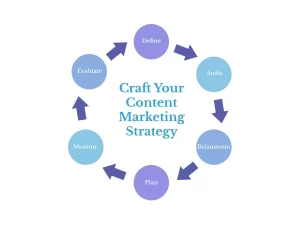How to Create a Content Marketing Strategy That Works
Content marketing has become a cornerstone of digital marketing, providing businesses with a powerful way to engage and connect with their target audience. However, a successful content marketing strategy doesn’t happen by chance. It requires careful planning and execution. In this guide, we’ll walk you through the steps to create a content marketing strategy that works.
Table of Contents:
- Understanding Content Marketing
- Defining Your Goals and Objectives
- Identifying Your Target Audience
- Content Research and Ideation
- Content Creation and Optimization
- Content Distribution and Promotion
- Measuring and Analyzing Results
- Iterative Improvement
Let’s delve into each of these steps to help you craft an effective content marketing strategy.
1. Understanding Content Marketing
What Is Content Marketing?
Content marketing involves creating and distributing valuable, relevant, and consistent content to attract and engage a defined target audience. It aims to build trust, brand authority, and long-term relationships with customers.
Content marketing is a strategic approach that focuses on creating and distributing valuable, relevant, and consistent content to attract and engage a specific target audience. This content can take various forms, including blog posts, articles, videos, infographics, podcasts, and social media posts. Here’s why understanding content marketing is crucial:

1.1. Value-Centric Approach
At its core, content marketing is about providing value. Instead of interrupting potential customers with intrusive ads, content marketing seeks to offer helpful, informative, or entertaining content that the audience willingly consumes.
1.2. Building Trust and Authority
Content marketing is a trust-building exercise. By consistently delivering valuable content that addresses the needs, questions, or pain points of your audience, you can establish trust and authority in your industry or niche.
1.3. Long-Term Relationships
Content marketing isn’t a one-time transaction; it’s about fostering long-term relationships with your audience. Through regular content creation and engagement, you can keep your audience connected to your brand over time.
1.4. Audience-Centric Approach
Successful content marketing is audience-centric. It involves understanding your target audience, their preferences, challenges, and aspirations. This understanding guides the creation of content that resonates with your ideal customers.
1.5. Educational and Informative
Content marketing often educates and informs. It helps your audience understand complex topics, make informed decisions, or learn new skills. By positioning your brand as a source of valuable knowledge, you become a trusted resource.
1.6. Brand Storytelling
Stories are a powerful tool in content marketing. Brands can use storytelling to connect with their audience on a personal level, conveying their mission, values, and the human side of their business.
1.7. Adaptable and Diverse
Content marketing is adaptable and diverse. It can take many forms to suit the preferences of your audience. Whether through blog articles, videos, or interactive content, the goal is to engage your audience on their preferred platforms.
1.8. Measurable Impact
One of the strengths of content marketing is its measurability. You can track various metrics, such as website traffic, social shares, conversion rates, and customer engagement, to assess the impact of your content and make data-driven improvements.
1.9. Evolving Landscape
The field of content marketing is continuously evolving. New platforms, technologies, and content formats emerge regularly. Staying updated with industry trends and adapting to changes is essential for long-term success.
In summary, content marketing is a strategic approach that revolves around providing value, building trust, nurturing long-term relationships, and educating your audience. It requires a deep understanding of your target audience and their needs, as well as the ability to adapt to evolving trends in the digital landscape. By embracing content marketing, businesses can create meaningful connections with their audience, establish authority in their industry, and drive sustainable growth.
2. Defining Your Goals and Objectives
Set Clear Goals
Before you start creating content, establish clear goals for your content marketing efforts. Are you looking to increase brand awareness, generate leads, drive website traffic, or boost sales? Your goals will shape your strategy.
3. Identifying Your Target Audience
Know Your Audience
Understanding your target audience is critical. Create detailed buyer personas that outline their demographics, interests, pain points, and online behavior. Tailor your content to resonate with these personas.
4. Content Research and Ideation
Research and Plan
Research topics and keywords that align with your audience’s interests and your business objectives. Develop an editorial calendar to organize content creation and ensure consistency.
5. Content Creation and Optimization
Create Valuable Content
Produce high-quality content that addresses your audience’s needs and questions. Optimize content for SEO by incorporating relevant keywords, headers, and meta tags.
6. Content Distribution and Promotion
Reach Your Audience
Share your content on various platforms, including your website, social media, email newsletters, and third-party websites. Engage with your audience and encourage sharing.
7. Measuring and Analyzing Results
Track Performance
Use analytics tools to measure the performance of your content. Monitor metrics like website traffic, conversion rates, social engagement, and lead generation.
8. Iterative Improvement
Continuously Refine
Based on data and insights, refine your content marketing strategy. Adjust your approach, content topics, and distribution channels to improve results over time.
By following these steps and continuously refining your strategy, you can create a content marketing plan that effectively engages your audience, drives business growth, and establishes your brand as an authority in your industry. Remember that content marketing is a long-term commitment, and success often comes from consistent effort and adaptation.






